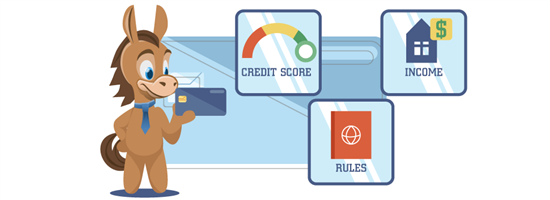What Do I Need to Get a Chase Credit Card
Ad Disclosure: This article contains references to products from our partners. We receive compensation if you apply or shop through links in our content. This compensation may impact how and where products appear on this site. You help support CreditDonkey by using our links.
Find out the minimum you need to get approved for a Chase credit card (including credit score, income, and other requirements).
 |
| © CreditDonkey |
- Credit Score Needed for Chase Cards
- Income Needed for Chase Cards
- What Is Needed for Chase Business Cards
- The Chase 5/24 Requirement
- Recent Hard Inquiries
- Amount of Existing Credit With Chase
- Chase 2/30 Rule
- Chase Sapphire Rules
Chase is one of the most popular credit card issuers, offering a wide range of options from beginner cards to premium travel rewards cards. The more premium cards will have stricter approval requirements.
Below, learn what you need to be approved for a Chase card.
CREDIT SCORE NEEDED FOR CHASE CARDS
While there is no hard-set credit requirement for any of Chase's cards, there are some general guidelines. More premium cards with higher annual fees will require higher credit score. Here's what you can expect:
- Excellent Credit Score Required (720+)
Chase Sapphire Preferred® (See Rates & Fees)
Chase Sapphire Reserve® (See Rates & Fees)
Chase Marriott Bonvoy Boundless - Good-Excellent Credit Score Required (700+)
Chase World of Hyatt
Chase United (Club & Explorer)
Chase IHG Rewards Club Premier
Chase Amazon Prime Rewards Visa Signature - Good Credit Score Required (680+)
Chase Freedom Unlimited®
Chase Southwest Rapid Rewards (all) - Average/Fair Credit Score Required (600+)
Chase Slate
Chase Disney Visa
Of course, the above is no means the definitive guide (and not the full list as we only included the more popular cards). For example, some people have reported being approved for the Sapphire Preferred credit card with a score under 700.
There are lots of other factors that Chase considers as well. We'll go over them next.
INCOME NEEDED FOR CHASE CARDS
There is no official income requirement for Chase cards. However, Chase will consider your income in the decision process. Chase needs to make sure it can support the credit limit and annual fee (if any).
Some of Chase's cards have minimum credit limits. For example, the minimum credit limit for the Chase Sapphire Preferred is $5,000 (and $10,000 for the Sapphire Reserve). If your income isn't high enough and Chase isn't comfortable giving you that much credit, then you won't be approved for the card.
Here are the different types of cards Chase offers and their minimum limits:
- Visa Traditional: Typically $500 minimum
Includes the Freedom cards, Southwest cards, and Disney cards. - Visa Signature: $5,000 minimum
Includes the Sapphire Preferred, Amazon Prime Rewards, United Explorer cards, Marriott Bonvoy, and World of Hyatt. - Visa Infinite: $10,000 minimum
Includes Chase Sapphire Reserve. - World Elite Mastercard: $5,000 minimum
Includes the IHG Rewards Club cards.
You can use this information to make a more informed guess on whether you'd be approved or not. For example, most Sapphire Reserve cardholders have income closer to six digits. Chase Preferred cardholders generally have income over $50,000.
WHAT IS NEEDED FOR CHASE BUSINESS CARDS
Chase business cards are rumored to be not the easiest business credit cards to get. All Chase business cards are Visa Signature cards with a minimum of $5,000 credit limit.
The two most important things you need are:
- An excellent credit score (usually 720+)
- A for-profit business
In the application, you'll need to fill out information such as your type of business, annual revenue, number of employees, and years in business. If you don't have a real business, you most likely won't be approved no matter how great your credit.
- If you're a freelance web designer
- If you have an Etsy shop
- If you sell books on eBay
- If you drive Uber in your spare time
- If you tutor students
- If you sell cookies at the farmers market
Don't worry if your business is new and you don't have much (or any) business revenue yet. When determining approval, Chase will also look at your personal credit history and personal income.
It's uncommon to get an instant approval on Chase business cards. If you get the pending response, we recommend that you DON'T jump the gun and call reconsideration. That may actually hurt your chances as now you'll have to explain your business to an analyst. It's better to just wait for the system to process your application and then call recon after you've been denied.
STAY UNDER THE CHASE 5/24 REQUIREMENT
You need to stay under Chase's 5/24 policy to even be considered for approval. This rule is the biggest reason why those with excellent scores get denied.
This rule says that if you've opened 5 credit card accounts in the past 24 months (with any bank), you will automatically be denied for a new Chase card, even if you have a perfect credit score. This is an unofficial, but widely accepted, rule.
As of November 2018, ALL Chase credit cards are subjected to this rule. There are no longer any Chase cards to which this rule does not apply.
Mostly, the 5/24 limit is for new personal card accounts. If you opened some new business credit cards in the past 2 years, they may not be counted (with some exceptions). Be sure to read our detailed article about this 5/24 rule.
DON'T HAVE TOO MANY RECENT HARD INQUIRIES
Also pay attention to how many recent hard inquiries you've had on your credit report. People have reported being rejected because of too many inquiries. This may give banks the impression that you're desperate for credit.
It's unclear what number Chase considers to be "too many." If you've been shopping around for financing (like for a mortgage or a new car), it may be best to wait a couple of months and then apply for a Chase card.
If you do get denied for this reason, you can call reconsideration and explain the inquiries.
- 1-888-270-2127 (personal cards)
- 1-800-453-9719 (business cards)
AMOUNT OF EXISITING CREDIT WITH CHASE
Chase usually has an overall amount of credit they're willing to give you. They have an internally calculated number based on your income and other financial factors.
If you already have a couple of Chase cards, maybe you're nearing or maxed out on the limit, and they wouldn't want to issue you a new card with more credit (even if you meet all other qualifications).
In this case, you can ask if you can ask to transfer some limit over to the new card. This way, you're not getting more credit with Chase.
CHASE 2/30 RULE
This is another unofficial rule that says that you cannot be approved for more than 2 Chase cards within any 30-day period. Usually, this goes for 2 personal cards.
Many applicants have luck when they apply to 2 personal cards at the same time. An advantage is that this will be just one hard inquiry on your credit report. However, this usually works best when the 2 cards are not from the same family (for example, a Chase Freedom Unlimited and a Chase co-branded card).
If you're not sure whether you'd be approved, we think it's better to just apply to one first. And then apply for the second one after you've gotten approved.
There are also reports of people who were approved for 2 personal cards AND 1 Chase business card within 30 days. From user reports, it's usually best to submit the business credit card application separately.
CHASE SAPPHIRE RULES
Lastly, there are some rules specifically for the popular Chase Sapphire cards. This includes the Sapphire Preferred and Sapphire Reserve (and an old no-annual-fee Sapphire card that's no longer open to new applicants).
You cannot own more than one card in the Sapphire family. For example, if you already have the Sapphire Preferred and now want the Reserve, you will not be able to apply. In this case, you have to call customer service and do one of 2 things:
- Upgrade your current Preferred to Reserve, or
- Close your Preferred account and apply to Reserve.
There are some rules regarding the welcome bonus too. You can only earn the welcome bonus on a Sapphire card once every 48 months.
BOTTOM LINE
Hopefully you have a better idea of what is needed for a Chase credit card. Remember that there is no official credit or income requirement. But you can use the above guidelines to assess how qualified you are before applying. If you think you're currently falling short, we recommend working on building your credit first.
Write to Anna G at feedback@creditdonkey.com. Follow us on Twitter and Facebook for our latest posts.
Note: This website is made possible through financial relationships with some of the products and services mentioned on this site. We may receive compensation if you shop through links in our content. You do not have to use our links, but you help support CreditDonkey if you do.
Editorial Note: Any opinions, analyses, reviews or recommendations expressed in this article are those of the author's alone, and have not been reviewed, approved or otherwise endorsed by any card issuer. This site may be compensated through the Advertiser's affiliate programs.
Editorial Note: This content is not provided by Chase. Any opinions, analyses, reviews or recommendations expressed in this article are those of the author's alone, and have not been reviewed, approved or otherwise endorsed by Chase. This site may be compensated through the Advertiser's affiliate programs.
For rates and fees of the Chase Sapphire Preferred® Card, please click here.
For rates and fees of the Chase Sapphire Reserve® card, please click here.
For rates and fees of the Chase Freedom Unlimited® card, please click here.
Read Next:

